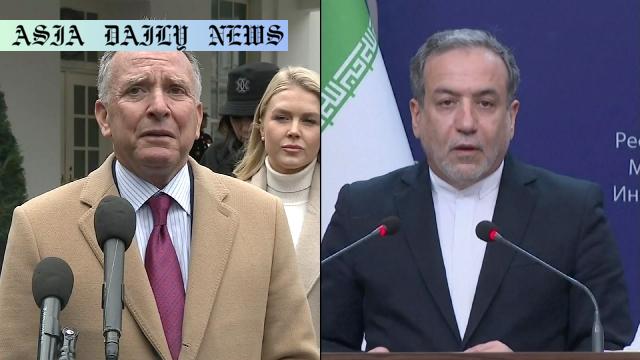Nuclear Talks: US and Iran agree to continue discussions despite ongoing disputes over uranium enrichment levels.

Background of US-Iran Nuclear Talks
On Sunday, senior delegations from the United States and Iran convened in Oman for another round of high-level discussions concerning Tehran’s controversial nuclear program. Led by US Special Envoy to the Middle East, Steve Witkoff, and Iranian Foreign Minister Abbas Araghchi, the talks come amid mutual distrust and significant geopolitical stakes. The United States has long expressed concerns about Iran’s uranium enrichment capabilities, which it alleges could lead to the development of nuclear weapons. Conversely, Iran asserts that its nuclear program is strictly for peaceful purposes, citing energy generation and medical applications as its primary objectives.
Despite their opposing positions, both parties signaled a willingness to continue discussions in the coming weeks, with Araghchi hinting that negotiations surrounding technical facets of the program showed incremental progress. Notably, a senior US official revealed that the discussions, which lasted over three hours, took place both directly and indirectly. Such multi-layered conversations reflect the complexity and sensitivity of the issues at hand. The acknowledgment of progress, albeit slow, offers a glimmer of hope for future rounds of dialogue.
The Core Dispute: Uranium Enrichment
The primary sticking point in these talks remains Iran’s uranium enrichment program. The US has pushed for a complete cessation of enrichment activities, arguing that this is the only way to ensure Iran does not pivot to weaponization. However, Iranian officials have firmly rejected this demand, maintaining that enrichment remains a critical and non-negotiable pillar of their sovereign rights. They further argue that such activities are sanctioned under the Nuclear Non-Proliferation Treaty (NPT), to which Iran is a signatory.
Iran has, however, indicated that it is open to negotiating the levels of enrichment and other auxiliary technical elements. Discussions around transparency measures and the potential for oversight by international bodies like the International Atomic Energy Agency (IAEA) formed a significant portion of the Oman meeting. Araghchi’s assertion that the principle of enrichment is “not negotiable” underscores Iran’s resolve but also hints at a potential middle ground, especially if Washington demonstrates flexibility on its sanctions regime.
The Role of Sanctions in the Negotiations
Another major roadblock in the ongoing negotiations is Iran’s demand for the US to lift its sanctions. Over the years, Washington has imposed a series of crippling economic measures on Tehran, targeting everything from oil exports to financial transactions. These sanctions have severely impacted Iran’s economy and have been cited by Iranian officials as unjust and coercive. Tehran argues that sanctions are not only a tool of economic warfare but also a barrier to trust and progress in negotiations.
For the US, sanctions represent a leverage point, one that cannot be relinquished without concrete guarantees of compliance from Iran. The Biden administration has adopted a cautious approach, signaling its willingness to roll back some sanctions should Iran demonstrate adherence to its nuclear obligations. However, the specifics of such an arrangement remain undefined, and trust between the two nations continues to be the overarching challenge.
Prospects for Future Discussions
Despite the challenges, Sunday’s talks concluded on a relatively optimistic note, with both sides agreeing to reconvene within a week. The commitment to continued dialogue is a sign that neither party is willing to abandon negotiations altogether, even in the face of persistent disagreements. The focus in the next round of talks is expected to be on bridging significant technical gaps while simultaneously addressing broader political concerns.
This cautious optimism does not ignore the difficulties ahead. The road to a comprehensive agreement will likely be long and arduous, punctuated by moments of progress and setback. However, the fact that both nations are still at the negotiating table demonstrates a mutual recognition of the high stakes involved and the potentially catastrophic consequences of failure.
Why This Matter Goes Beyond the US and Iran
The implications of a US-Iran nuclear agreement extend far beyond the bilateral relationship between the two countries. For the broader Middle East, a deal could signify a turning point in security and stability, reducing fears of nuclear proliferation in one of the most volatile regions in the world. For global powers, including the European Union, Russia, and China, the stakes involve maintaining the integrity of international non-proliferation efforts and averting a new nuclear arms race.
Moreover, a resolution could open up economic opportunities by integrating Iran back into the global economy, thereby addressing a multitude of challenges tied to sanctions and economic isolation. Nonetheless, without compromise on some of the more contentious issues, including uranium enrichment and sanctions, achieving such an outcome remains a precarious endeavor.
Commentary
The Balance Between Progress and Dispute
The latest round of US-Iran nuclear talks signifies both the challenges and opportunities inherent in high-stakes diplomacy. While the disagreement over uranium enrichment dominates the headlines, it is important to appreciate the incremental progress achieved during these conversations. The acknowledgment by both sides to continue discussing technical elements is a hopeful sign.
Sanctions: A Double-Edged Sword
One cannot ignore the role of sanctions in these negotiations. While they provide Washington with significant leverage, they also serve as a barrier to trust. Tehran views these economic measures as unjust and damaging, which complicates the US’s position. Striking the right balance between maintaining leverage and offering meaningful relief will likely define the success or failure of these talks.
Long Road Ahead
The willingness to return to the negotiating table reflects a shared understanding of the stakes. However, with deep-rooted mistrust and contentious issues still unresolved, the path to an agreement remains long and fraught with challenges. Both sides must demonstrate a commitment to compromise and avoid letting political pressures derail the process.
Global Significance
Finally, it is critical to remember the global stakes tied to these negotiations. A successful agreement could not only stabilize the Middle East but also strengthen international non-proliferation norms. Conversely, failure risks escalating tensions and undermining global trust in diplomatic resolutions. The world is undoubtedly watching closely as these discussions unfold.


